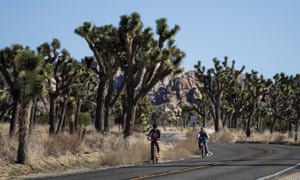“Efforts to win endangered species protections for the imperiled Joshua tree in California are encountering entrenched opposition from local officials, who say the added protections may prevent real estate development and economic growth.
On Thursday, the California fish and game commission (FGC) will vote on a petition that, if approved, will grant the yucca plants temporary protected status for a year while the agency conducts a study.
But local government officials say that granting additional protections to the plant will hinder real estate development and cause undue economic damage.
The petition was authored by a local conservationist and grew out of increasing scientific evidence that Joshua trees face existential threats, from urban development and climate change. Brendan Cummings, the conservation director for the Center for Biological Diversity and author of the petition, believes local protections for the Joshua tree are superficial at best and often ignored.
He believes local officials’ opposition to granting the Joshua endangered status in the state stems from deference to real estate developments.
Since spring, San Bernardino county officials have been outspoken against this proposed listing. Robert Lovingood, a district official who serves a wide swath of the county, warned his constituents it will have a “devastating economic impact” on the high desert region.
The Joshua tree – which is not a tree at all but actually a succulent called Yucca brevifolia – grows and reproduces slowly. They are associated with the Mojave desert, and millions of tourists flock annually to see them in national parks and wildlife preserves.
But the moths the plants rely on for pollination are becoming more scarce. Wildfires are shrinking the areas where Joshua trees remain. This week, the Dome fire, which sparked on Saturday in the Mojave national preserve, incinerated more than 43,000 acres in some of the world’s densest old-growth Joshua tree forest. Some models predict the plant could be virtually eradicated by the end of the century.
In Yucca Valley, a small town north-west of Joshua Tree national park, the city council, the local water district and the mayor have all come out strongly against the petition to study the Joshua tree. The county and Yucca Valley submitted a joint legal brief to FGC stating they “strongly oppose” the move, citing a lack of evidence that Joshua trees are threatened and even argued that “population levels have remained stable or potentially increased over the past 50 years.”

Yucca Valley officials cite a local law – requiring residents and businesses to obtain a permit before cutting down any of the succulents on their property – as proof the Joshua tree has ample environmental protection.
But a recent public records request – filed by a local retired activist, Ernesto Nevarez – showed the relative ease of obtaining a permit to cut down the yucca plants. Of 147 permit requests the city received in 2020, none have been denied.
Nevarez believes this is evidence the city does little to protect the Joshua trees. “After I got the documents, I thought, ‘This is bullshit,’” Nevarez said in a call. He added, “Not one [permit] was declined, there’s no appeal process, there’s no procedural remedy for opponents or proponents of any tree.”
Mayor Jeff Drozd has repeatedly argued on social media that further restrictions would bring “red tape, cost and delays” for homeowners but denied charges that he doesn’t care for Joshua trees.
“I personally do not oppose protection of Joshua trees, but there is little regard for private property owners,” Drozd said in an email. Speaking to the Desert Sun, he described the possible approval of the petition as “horrible for our town”.
But Cummings, the author of the petition, says his goal isn’t to stop development. Moreover, he argues that if his petition passes, it will have positive ripple effects; protections for the Joshua tree will blanket less prominent desert plants and wildlife, such as the endangered desert tortoise.
“The Joshua tree, because of its iconic status and because of some of its unique attributes, can be a model of doing climate adaptation planning to ensure that biodiversity of the state is protected,” Cummings said. “Right now, it’s a symbol of our utter failure as a society to address climate change. I’d like to think it can become a symbol of us coming together.”
No comments:
Post a Comment